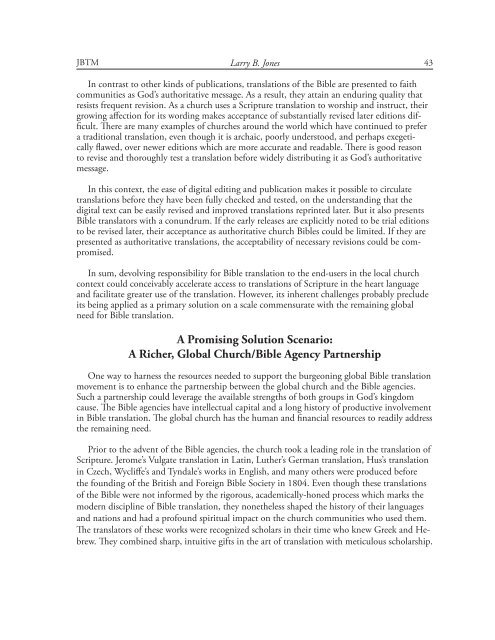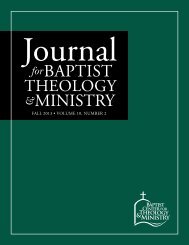Bible Translation as Missions
pTf2MG
pTf2MG
You also want an ePaper? Increase the reach of your titles
YUMPU automatically turns print PDFs into web optimized ePapers that Google loves.
JBTM Larry B. Jones43In contr<strong>as</strong>t to other kinds of publications, translations of the <strong>Bible</strong> are presented to faithcommunities <strong>as</strong> God’s authoritative message. As a result, they attain an enduring quality thatresists frequent revision. As a church uses a Scripture translation to worship and instruct, theirgrowing affection for its wording makes acceptance of substantially revised later editions difficult.There are many examples of churches around the world which have continued to prefera traditional translation, even though it is archaic, poorly understood, and perhaps exegeticallyflawed, over newer editions which are more accurate and readable. There is good re<strong>as</strong>onto revise and thoroughly test a translation before widely distributing it <strong>as</strong> God’s authoritativemessage.In this context, the e<strong>as</strong>e of digital editing and publication makes it possible to circulatetranslations before they have been fully checked and tested, on the understanding that thedigital text can be e<strong>as</strong>ily revised and improved translations reprinted later. But it also presents<strong>Bible</strong> translators with a conundrum. If the early rele<strong>as</strong>es are explicitly noted to be trial editionsto be revised later, their acceptance <strong>as</strong> authoritative church <strong>Bible</strong>s could be limited. If they arepresented <strong>as</strong> authoritative translations, the acceptability of necessary revisions could be compromised.In sum, devolving responsibility for <strong>Bible</strong> translation to the end-users in the local churchcontext could conceivably accelerate access to translations of Scripture in the heart languageand facilitate greater use of the translation. However, its inherent challenges probably precludeits being applied <strong>as</strong> a primary solution on a scale commensurate with the remaining globalneed for <strong>Bible</strong> translation.A Promising Solution Scenario:A Richer, Global Church/<strong>Bible</strong> Agency PartnershipOne way to harness the resources needed to support the burgeoning global <strong>Bible</strong> translationmovement is to enhance the partnership between the global church and the <strong>Bible</strong> agencies.Such a partnership could leverage the available strengths of both groups in God’s kingdomcause. The <strong>Bible</strong> agencies have intellectual capital and a long history of productive involvementin <strong>Bible</strong> translation. The global church h<strong>as</strong> the human and financial resources to readily addressthe remaining need.Prior to the advent of the <strong>Bible</strong> agencies, the church took a leading role in the translation ofScripture. Jerome’s Vulgate translation in Latin, Luther’s German translation, Hus’s translationin Czech, Wycliffe’s and Tyndale’s works in English, and many others were produced beforethe founding of the British and Foreign <strong>Bible</strong> Society in 1804. Even though these translationsof the <strong>Bible</strong> were not informed by the rigorous, academically-honed process which marks themodern discipline of <strong>Bible</strong> translation, they nonetheless shaped the history of their languagesand nations and had a profound spiritual impact on the church communities who used them.The translators of these works were recognized scholars in their time who knew Greek and Hebrew.They combined sharp, intuitive gifts in the art of translation with meticulous scholarship.



